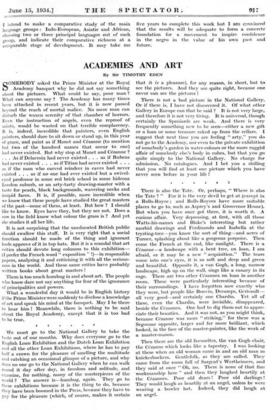ACADEMIES AND ART
By Sir TIMOTHY EDEN
SOMEBODY asked the Prime Minister at the Royal Academy banquet why he did not say something about the pictures. What could he say, poor man ? What can anyone say ? The Academy has many times been attacked in recent years, but it is now passed beyond the reach of mortal malice. No mere man can disturb the waxen serenity of that chamber of horrors. Even the instruction of angels, even the reproof of saints, would be wasted on that terrible complacency. It is, indeed, incredible that painters, even English painters, should dare to sit down or stand up, in this year of grace, and paint as if Manet and Cezanne (to mention but two of the hundred names that occur to one) had never existed. But why stop at Manet and Cezanne ? . . . As if Delacroix had never existed . . . as if Rubens had never existed . . . as if Titian had never existed . . . as if the man who carved reindeer in caves had never existed . . . as if no one had ever existed but a swivel- eyed professor in some red brick school in some hideous London suburb, or an arty-tarty drawing-master with a taste for pearls, black backgrounds, wavering necks and insipid faces. It is, if possible, more incredible when we know that these people have studied the great masters of the past—some of them, at least. But how ? I should like to know. Eyes have they, but they see not. Does a cow in the field know what colour the grass is ? And yet she studies it all her life.
It is not surprising that the uneducated British public should swallow this stuff. It is very right that a social function should be made of the thing and .ignorant lords approve of it in top hats. But it is a scandal that art critics should devote long columns to this exhibition— (I prefer the French word " exposition " l)—in responsible papers, analysing it and criticising it with all the serious- ness in the world. And these same critics have probably written books about great masters !
There is too much humbug in and about art. The people who know dare not say anything for fear of the ignorance of principalities and powers.
What a wonderful day it would be in English history if the Prime Minister were suddenly to disclose a knowledge of art and speak his mind at the banquet. May I be there to hear him Meanwhile, there is nothing to be said about the Royal Academy, except that it is too bad to be true.
; •
















































 Previous page
Previous page